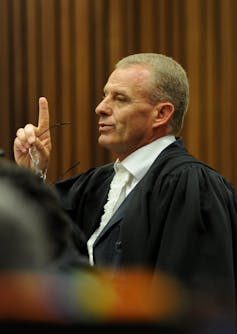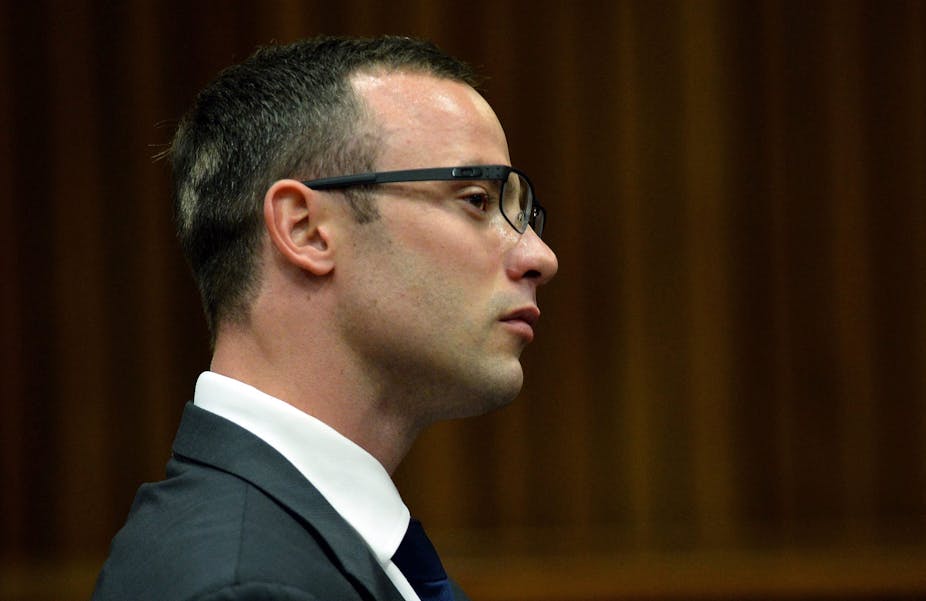In the legal system, first-hand memory reports of victims, witnesses and suspects are crucial evidence. Some cases rely also on physical evidence and expert testimony. But the accounts of those who experienced the event remain central in the legal process, as we’ve seen this week in the trial of South African Olympian Oscar Pistorius.
In the early hours of February 14, 2013, Pistorius shot and killed his girlfriend, Reeva Steenkamp. This fact is not in dispute. Pistorius claims, however, that he mistook Steenkamp for an intruder. He is on trial in the High Court of South Africa in Pretoria for premeditated murder. And in a first for South Africa, the entire trial is being broadcast and tweeted live.
Watching prosecutor Gerrie Nel cross-examine Pistorius reminds us that in the courtroom, detailed, complete, and reliable recall is expected and demanded. But is it too much to expect?
Reconstructing memories
Memory serves many functions. Remembering helps us make meaning of our lives, cultivate a sense of ourselves, guide our behaviour, plan for the future, develop and maintain personal and group relationships, and pass knowledge on to future generations.
In ordinary life, complete recall of every detail of an event is not needed and perhaps rarely achieved. Memory is reconstructive not reproductive like a videotape. Memories are a product of a person’s experience of reality – not of reality itself – both at the time of the event and at the time of remembering.
This does not mean that truth and reconstruction are incompatible. Reconstruction does not always bring distortion and we can reconstruct the truth. Here, “truth” might typically involve remembering the gist of an event and some, but not all, details.
We often care less about precisely capturing “the whole truth” than about the uptake of our claims about past events. It matters that other people hear and give full weight to our accounts of what we have lived through, what it means to us, and how it makes us feel.
In the courtroom, a much more stringent standard is applied because of the consequences for justice of memory errors.
The Pistorius trial
During cross-examination on the 19th day of his trial, prosecutor Nel first asked Pistorius to say how many of his memories were true and how many were reconstructed. He then pushed Pistorius to recall the placement of a fan on a balcony of the bedroom near where Steenkamp was killed.
Next, Nel asked a series of questions about whether the fan was plugged in and, if so, exactly where. Nel challenged Pistorius when Pistorius’ recall differed from accounts he provided during his bail hearing in February 2013 or during his “plea explanation” at the beginning of the trial.
Pistorius argued that he couldn’t (and implied that he shouldn’t be expected to) remember where a fan was plugged in a year ago. When asked by Nel if his version of the night in question had changed, Pistorius said “no”. But Nel argued discrepancies in Pistorius’ memories were important: “It’s not insignificant Mr Pistorius. It will show that you are lying.”

Today the court will continue evaluating the truth of what happened on the night Steenkamp died. We are in no position to judge. But this trial illustrates a broader point: people generally believe that truth in memory means detailed, complete, and reliable memories, which we easily can distinguish from later reconstructions.
The legal system relies on our ability to remember in this way (even as it acknowledges and warns against the fallibility of witnesses). But is it possible? And if we are inaccurate about a detail of an event that we’ve experienced, does it follow that we are untruthful and that our whole account be discarded?
To answer these questions we need to know how memories typically change across time and repeated retellings, since victims, witnesses and suspects repeatedly recall what happened.
Changed but true
In our research, we ask people to tell us memories of important past events and retell them one week later.
Many show discrepancies across their accounts even in this short time period. They often make estimation changes (in week one, for instance, they say they went out at 9.30am; in week two they say 10.30am) or sensory changes (in week one they say they were wearing a blue shirt; in week two they say a red shirt).
When challenged about these discrepancies, our participants say they are unimportant; they believe their accounts remain true over time.
Of course, other factors are at work on memory in the legal setting. We know that both strong emotions and the passage of time influence the content and accuracy of remembering.
How, then, should we interpret variations in memory over time and retellings? Are they deliberate and deceptive or not deliberate? Are they significant or insignificant?
In our view, this depends on the number, pattern, and nature of changes as well as what is at stake. There are few places where the stakes are so high as in a courtroom and where the need for truthful accounts is so great.
But research suggests that “diagnosing” truth of an entire account from fluctuations in specific memory details can be problematic. UK researchers, for example, have drawn attention to genuine refugees whose claims for asylum are rejected because over repeated retellings details in their accounts of persecution sometimes change.
The case of Oscar Pistorius, and other recent cases that have turned on memories of past events, help us appreciate the legal and scientific challenges of navigating the gap between how people ordinarily remember their past and the memory evidence needed to decide legal cases.

